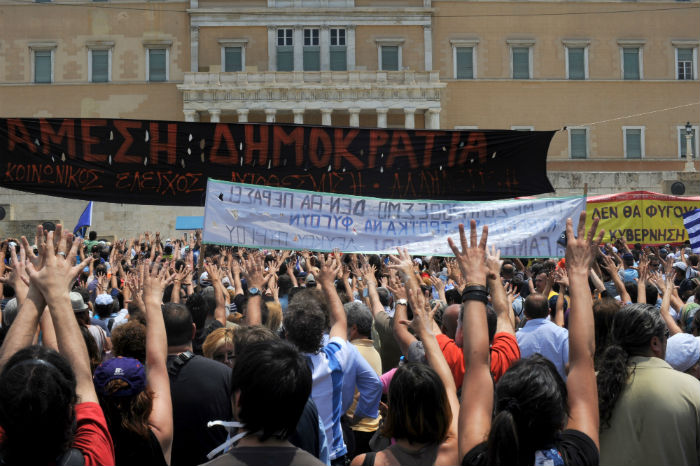- 173Shares
- Facebook134
- LinkedIn12
- E-mail10
- Buffer
- WhatsApp17
Nikos Pappas, Greece’s minister of state, hopes to shatter the corrupt system of mutual interdependence of the country’s media, politicians and business elite. Nepotism and incapacity have prevented previous governments from adequately regulating the media sector. Pappas believes allocating licences to national TV stations, which have essentially been operating on temporary permits since the late 1980s, will do the trick.
In early September, the Syriza-led government held a politically controversial TV licence auction, aiming to cut the number of national TV channels from eight to four. The auction, which raised €246 million, awarded licences to stations Skai and Antenna; also to Alter Ego TV, a new channel owned by shipping magnate and Olympiacos FC owner Evangelos Marinakis. The fourth licence was awarded to construction mogul Yiannis Kalogritsas – who later decided to pull out of the process altogether.
Existing operators Alpha TV and Star Channel failed to secure a licence, while Mega TV, Greece’s first private station, established in 1989, did not even qualify to compete.
Is it too late to save independent journalism in Greece?
However, Nikos Pappas seems to be missing the point. The damage inflicted on independent Greek journalism over the past decades might be irreparable. A recent Reuters Institute report shows that trust in news is lowest in Greece among the 26 researched countries, chiming with the findings of the latest Eurobarometer survey, that only 20 percent of Greeks trust TV as an institution.
With their credibility bruised and an economy in tatters, making ends meet is challenging for Greek media professionals. “That’s when ethics and standards can be compromised,” says Nick Malkoutzis, editor of Macropolis, a subscription-based economic analysis outlet.
“It’s not uncommon for journalists to receive phone calls from either politicians or businessmen asking them not to publish something,” concedes George Pleios, Head of the Communication and Media Studies department at the University of Athens, adding that in some cases “such pressure can take the form of a funding proposal.”
The media environment in Greece is becoming increasingly hostile, especially for those not employed by big outlets. “Independent journalists have to prove they don’t belong to the toxic ecosystem of legacy media,” says Tassos Morfis of Athens Live, a recently-launched crowdfunded website.
Investigative journalism threatened by vested interests
It is not surprising that Greece has seen one of the biggest-ever falls in the World Press Freedom Index, dropping 50 places in 2015, only to regain two spots in 2016. As the inadequate legal framework has failed to protect journalists from external pressures, investigative reporting is under threat.
Take the example of The Press Project, an independently-financed investigative outlet. “Since 2010, there have been 11 defamation-related lawsuits brought against us, all of which have been won in court,” says Kostas Efimeros, the website’s founder.
“The Greek press law is particularly problematic. Its many conflicting provisions make decisions entirely dependent on the judge’s discretion,” continues Efimeros.
A recent scoop on tax avoidance involving Evangelos Marinakis, the Greek shipowner who owns Alter Ego TV, had to be checked “word-by-word” by a lawyer before publication.
The International Press Institute has called on the Greek government to repeal all criminal laws that can be used to silence journalists. A bill passed in December aiming to combat the ease with which journalists could be taken to court for defamation, is a step in the right direction.
Need for an independent regulator
Professional standards need to be upheld, too. No independent regulator exists in Greece to hold print and online media to account, protect individual journalist rights and help to maintain freedom of expression for the press.
The Journalists’ Union of the Athens Daily Newspapers “only covers labour rights and does not protect journalists from the arbitrariness of their employers in exercising their profession,” says Professor Pleios. Mired in cronyism, its factions are journalistic versions of the established political parties “playing a key role, even with regards to disciplinary penalties.”
The National Council for Radio and Television (NRCTV) is the only operative media watchdog in the country, yet it is currently idle. “As some members’ mandate expired, it does not meet, take decisions, nor it is in a position to impose sanctions,” explains Pleios.
Surely, if the fourth estate were to function properly in the birthplace of democracy, Nikos Pappas needs to deliver an institutional framework that protects and enables journalists to do their job properly. Putting the NRCTV back to work would be a good start.
Related EJO stories: Athens Live, challenging Greece’s ‘Powerful Media Barons’
Pic credit: Ggia Wikimedia CC
- 173Shares
- Facebook134
- LinkedIn12
- E-mail10
- Buffer
- WhatsApp17
Tags: corruption, Democracy, government, Greece, Greek, International Press Institute, Journalism, licences, media, nikos pappas, regulation, Television, World Press Freedom Index













































